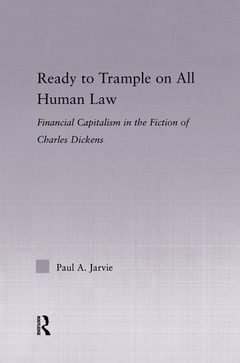Ready to Trample on All Human Law Finance Capitalism in the Fiction of Charles Dickens Studies in Major Literary Authors Series
Auteur : Jarvie Paul A.

This book explores the relationship between Dickens?s novels and the financial system. Elements of Dickens?s work form a critique of financial capitalism. This critique is rooted in the difference between use-value and exchange-value, and in the difference between productive circulations and mere accumulation. In a money-based society, exchange-value and accumulation dominate to the point where they infect even the most important and sacred relationships between parts of society and individuals.
This study explores Dickens?s critique from two very different points of view. The first is philosophical, from Aristotle?s distinction between "chrematistic" accumulation and "economic" use on money through Marx?s focus on the teleology of capitalism as death. The second view is that of nineteenth-century financial journalism, of "City" writers like David Morier Evans and M. L. Meason,, who, while functioning as "cheerleaders" for financial capitalism, also reflected some of the very real "dis-ease" associated with capital formation and accumulation.
The core concepts of this critique are constant in the novels, but the critique broadens and becomes more pessimistic over time. The ill effects of living in a money-based society are presented more as the consequences of individual evil in earlier novels, while in the later books they are depicted as systemic and pervasive. Texts discussed include Nicholas Nickleby, A Christmas Carol, Little Dorrit and Our Mutual Friend.
Introduction: Dickens's Evolving Critique of Financial Capitalism 1. "I hold myself released from such hard bargains as these": Nicholas Nickleby and "Brotherly" Capitalism 2. "With what a strange mastery it seized him for itself": The Conversion of the Financier in A Christmas Carol 3. "Terribly wild rang the panic cry": Finance, Panic and the Struggle for Life in Little Dorrit 4."Among the dying and the dead": Metonymy and Finance Capitalism in Our Mutual Friend
Date de parution : 04-2015
15.2x22.9 cm
Date de parution : 07-2005
15.2x22.9 cm
Thèmes de Ready to Trample on All Human Law :
Mots-clés :
finance; capitalism; nicholas; nickleby; individual; benevolence; daniel; deronda; dur; mutual; Ho Urs; Corporate Money Men; Nicholas Nickleby; Dead Man; Human Kind; Human Beings; CHRISTMAS CAROL; Daniel Deronda; Individual Benevolence; Pilgrim Letters; Roger Carbury; Venus's Shop; Bio Economics; Marketplace Scene; Dickens's Work; OME; Mutual Friend; Ease; MRF; Metonymic Process; Young Man; Financial Jew; Lady Carbury; Invisible Woman; Dickens's Critique



